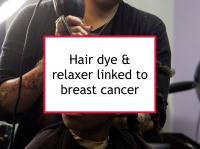While compounds identified as proven animal carcinogens are restricted from use in U.S. hair dye formulations, endocrine disrupting and other harmful chemicals continue to be employed by some manufacturers. For example, pyrogallol, which is found in some hair dyes, can lead to DNA strand breaks of a type associated with cancer.
In fact, evidence is accumulating that use of hair dye, especially dark permanent coloring, could increase breast cancer risk. For example, a Japanese study reported that testosterone levels were 14% higher in women who were long-term hair dye users. The same study reported that non-permanent hair dyes were linked to somewhat elevated estradiol levels. A Finnish study reported that use of hair dyes was associated with breast cancer incidence and that the risk increased with greater use. There also is evidence of a link between working as a cosmetologist or beautician and increased cancer risk, including breast cancer risk.
Hair relaxers, which are designed to assist in straightening tight curls or curly hair, are less well studied. However, a 2017 study found that lye-based hair relaxers are associated with increased risk of breast cancer in both African American and European-American women. Now a new study has reported that use of hair straighteners and/or permanent dyes is associated with higher breast cancer risk, especially among African American women.
Hair products marketed to African Americans can be harmful
African American women appear to be faced with a greater variety of potentially harmful products marketed specifically to them and their daughters. The trust and sense of joint identity that some companies take pains to establish with their African American customers does not necessarily translate into trustworthy products.
For example, there are a number of hair care and other products marketed to African American women that contain "placenta" (or placental extract), or "hormone" (or hormones) that should be avoided. Placental extract has been shown to stimulate hair growth, however it contains estrogens that can stimulate the development and growth of hormone receptor positive (ER+) breast cancer. Costlier products are not necessarily safer products. While many women avoid using harsh relaxers in their daughters' hair, the use of some hair oils can result in very early breast development and other signs of early puberty. Early puberty is a risk factor for breast cancer in adulthood.
Research links straighteners and permanent dye to breast cancer
The large prospective study referenced above was designed to investigate the links between hair dye and chemical straightener (relaxer) use and breast cancer risk by ethnicity. Products used predominately by African American women appear to incorporate more hormonally active compounds. The study included 46,709 women aged 35 to 74 and enrolled in the Sister Study between 2003 and 2009. In this case, "Sister" refers to a female sibling rather than an African American woman. Participants in the Sister Study had a sister with breast cancer but were initially breast cancer‐free themselves. Study participants completed questionnaires concerning past 12‐month hair product use upon enrollment (55% reported permanent dye use).
A total of 2,794 of the study participants were diagnosed with breast cancer during follow up (averaging 8.3 years). Use of permanent hair color was found to be associated with 45% higher risk of breast cancer in African American women and 7% higher risk in white women. Hair straightener use was found to be associated with breast cancer risk regardless of ethnicity—risk increased with frequency of use. Nonprofessional application of semi-permanent hair color and straighteners to others also were associated with increased risk of breast cancer.
The authors conclude that any straightener use and personal use of permanent dye was associated with higher breast cancer risk in the study population, especially among African American women.
Please click on the following tags for more information: African American; personal care products.
